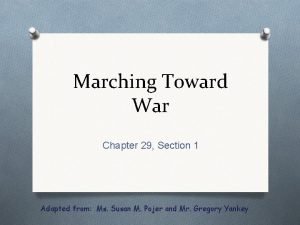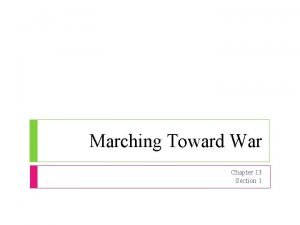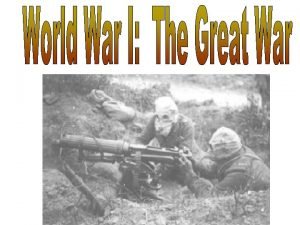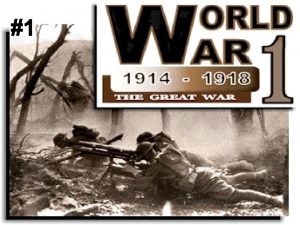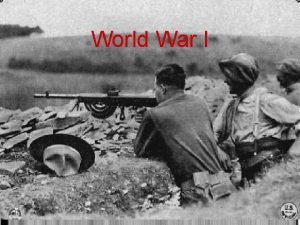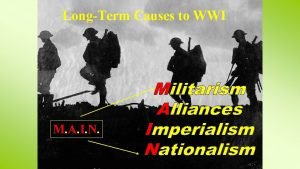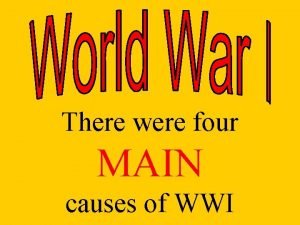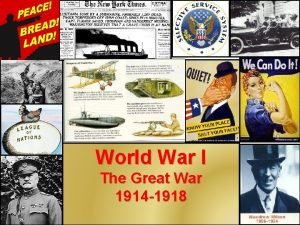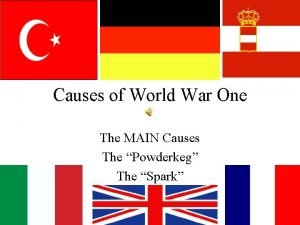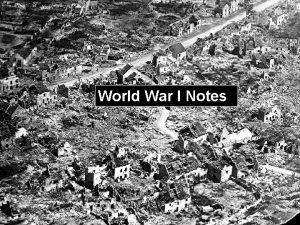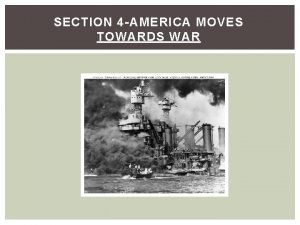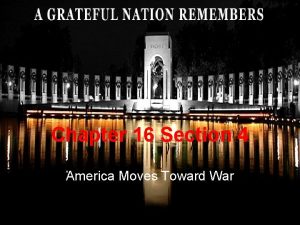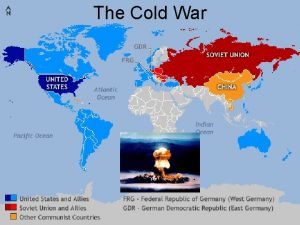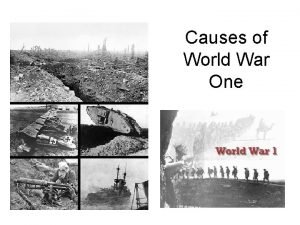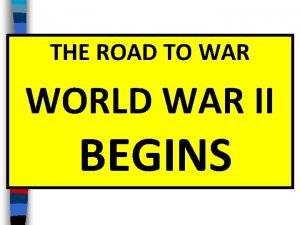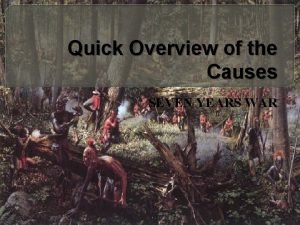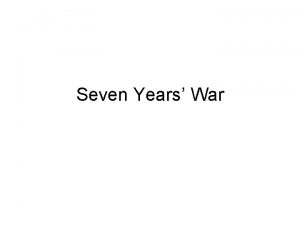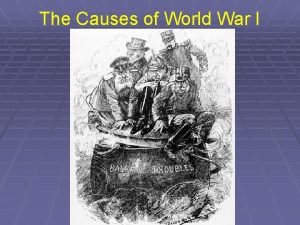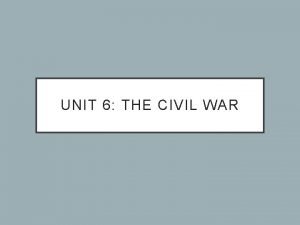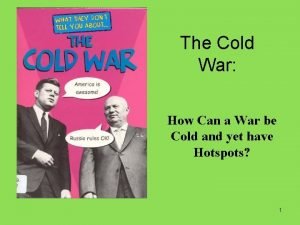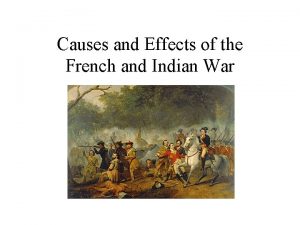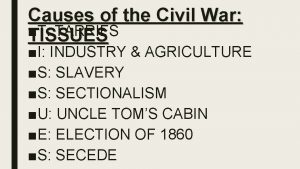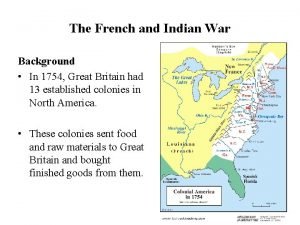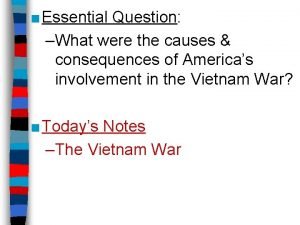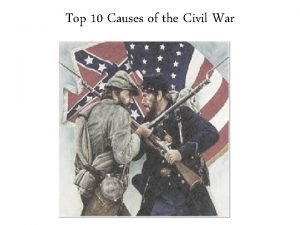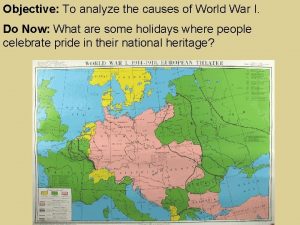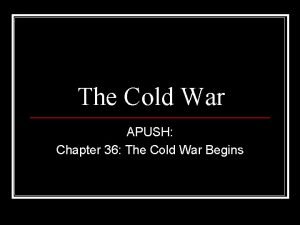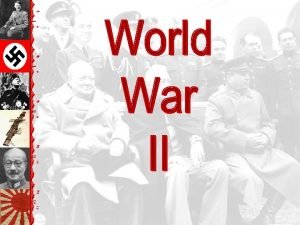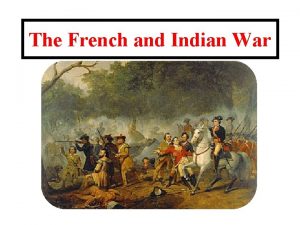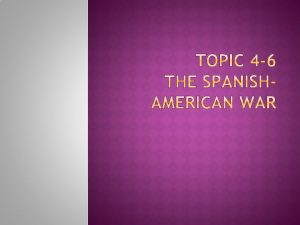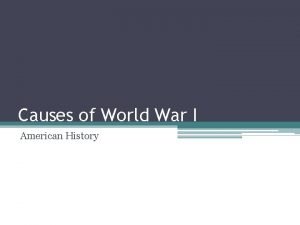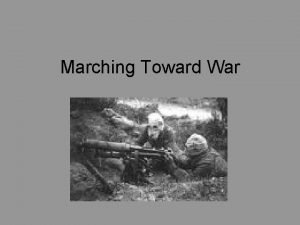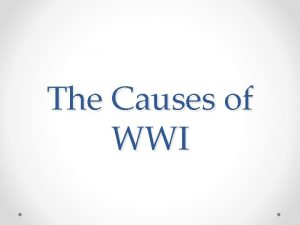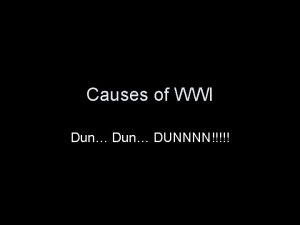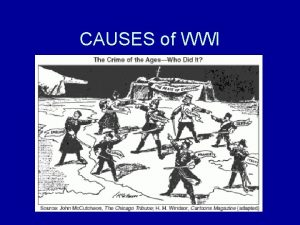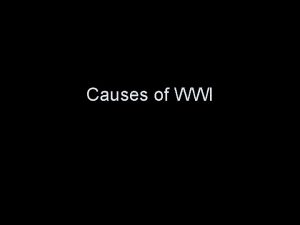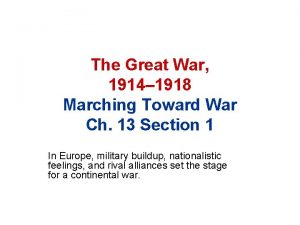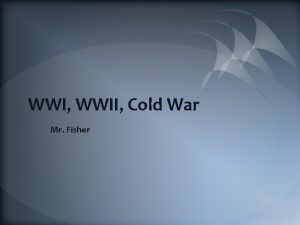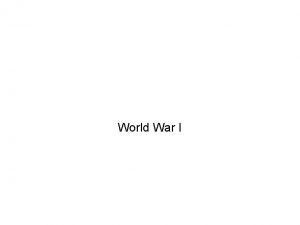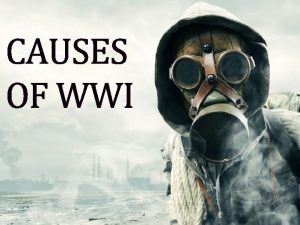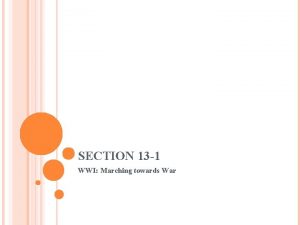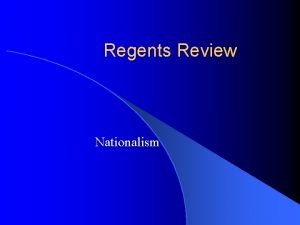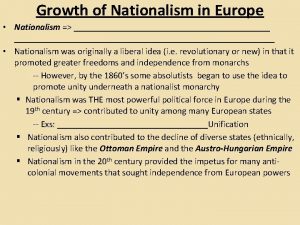Marching Toward War LongRange Causes of WWI Nationalism












![The Major Players: 1914 -17 Allied Powers: Central Powers: Nicholas II [Rus] Wilhelm II The Major Players: 1914 -17 Allied Powers: Central Powers: Nicholas II [Rus] Wilhelm II](https://slidetodoc.com/presentation_image_h/1cf5f5c7d01455e906140df2eb30487f/image-13.jpg)








































- Slides: 53

Marching Toward War

Long-Range Causes of WWI § Nationalism & Imperialism Each nation felt themselves superior to other nations This attitude created a desire to rule lands beyond their borders Example: Balkans (Russia, Turkey, Austria. Hungary Example: Morocco, North Africa (Germany & France) Example: Korea (Russia, Japan)

Aggressive Nationalism

Africa in 1914

Colonial Rivalries: Asia in 1914

Long-Range Causes of WWI § Pan-Slavism was a desire for Russia to protect Slavic people in Europe Serbia is a Slavic nation § Pan-Germanism was a desire for Germany to protect German-speaking people in Europe. Austria-Hungary was a German speaking nation

Pan-Slavism: The Balkans, 1914 The “Powder Keg” of Europe

Long-Range Causes of WWI § Militarism caused European countries to build up their armies and navies. created fear and distrust British: best & biggest navy Germany suspicious of Russia’s plan to modernize its army

Militarism (Arms Race) Total Defense Expenditures for the Great Powers [Ger. , A-H, It. , Fr. , Br. , Rus. ] in millions of £s. 1870 1880 1890 1900 1914 94 130 154 268 289 398 1910 -1914 Increase in Defense Expenditures France 10% Britain 13% Russia 39% Germany 73%

Long-Range Causes of WWI § Entangling Alliances Nations entered into agreements to help their allies in the event of war 1914: Two major alliances 1. Triple Alliance – Germany, Austria. Hungary, Italy, Ottoman Empire 2. Triple Entente – Britain, France, Russia (later on included Japan and many other nations)

The Alliance System Triple Entente: Triple Alliance:

Two Armed Camps! Allied Powers: Central Powers:
![The Major Players 1914 17 Allied Powers Central Powers Nicholas II Rus Wilhelm II The Major Players: 1914 -17 Allied Powers: Central Powers: Nicholas II [Rus] Wilhelm II](https://slidetodoc.com/presentation_image_h/1cf5f5c7d01455e906140df2eb30487f/image-13.jpg)
The Major Players: 1914 -17 Allied Powers: Central Powers: Nicholas II [Rus] Wilhelm II [Ger] George V [Br] Victor Emmanuel II [It] Enver Pasha [Turkey] Pres. Poincare [Fr] Franz Josef [A-H]

Europe in 1914

3. Economic & Imperial Rivalries

The “Spark”

Immediate Cause of WWI § June 28 th, 1914 Archduke of A-H Franz Ferdinand & wife visit Bosnian capital Sarajevo. Bosnians unhappy living under rule of Austria-Hungary Couple shot by 19 yr. old Serbian nationalist (Gavrilo Princip) Princip was a member of the Black Hand – a secret society determined to free Bosnia of A-H rule.

Archduke Franz Ferdinand & His Family

The Assassination: Sarajevo

The Assassin: Gavrilo Princip

WWI Begins

The Domino Effect w July 28: A-H declares war on. Serbia w July 31: Russia sends troops to aid Serbia w Aug 1: Germany declares war on Russia w Aug 3: Germany declares war on France & invades neutral Belgium. w Aug 4: Great Britain declares war on Germany


Recruitment Posters

The Western Front: A “War of Attrition”

The Western Front w The most important battles fought were in Europe, primarily France w Germany wanted to avoid fighting a two-front war: the Russians coming from the East and the French and British coming from the West Schlieffen Plan: defeat French first then fight the Russians

Schlieffen Plan

Western Front w August 4, 1914: Invasion of Belgium Germans easily defeated Belgium

Western Front w First Battle of the Marne German attempts to capture Paris stopped at the Marne River in September 1914 Allies hold off the Germans Tens of thousands killed Single most important event of the war Both sides dug in for a long fight (trench warfare)

The Western Front

Trench Warfare

Trench Warfare “No Man’s Land”

Trench Warfare

War Is HELL !!

Sacrifices in War

The War of the Industrial Revolution: New Technology

French Renault Tank

British Tank at Ypres

U-Boats

Poison Gas Machine Gun

Dispersion of Chlorine

Mustard Gas Burns

Mustard Gas Burns

Mustard Gas Burns

Flame Throwers Grenade Launchers

The Zeppelin

The Airplane “Squadron Over the Brenta” Max Edler von Poosch, 1917

The Flying Aces of World War I Eddie Rickenbacher, US Francesco Barraco, It. Eddie “Mick” Mannoch, Br. Willy Coppens de Holthust, Belg. Rene Pauk Fonck, Fr. Manfred von Richtoffen, Ger. [The “Red Baron”]

Germany’s “Big Bertha” Gun

The Western Front w Verdun German attack in 1916 Both sides lost 300, 000 British tried to attack Germans in the valley of the Somme River: 20, 000 British soldiers killed

Battle of Verdun

The Eastern Front w German & Russian border Russian/Serbs vs. Germans/A-H 30, 000 Russians killed at Battle of Tannenberg Russia was not as industrialized as other nations Germans controlled Baltic Sea so Russians could not get supplies from Allies By 1917, Russia goes through their own revolution (Lenin) 1918: Russia signs Treaty of Brest-Litovsk and withdraws from war Germany no longer has to fight on two fronts

Resources w w w Susan Pojer – Horace Greeley HS, NY Mr. Olson – JM Robinson HS, NC Darrell Wells – Mt. Pleasant HS, NC Glencoe – World History Mc. Dougal Littell – World History: Patterns of Interaction
 Chapter 29 marching toward war
Chapter 29 marching toward war Marching toward war
Marching toward war Chapter 13 section 1 guided reading marching toward war
Chapter 13 section 1 guided reading marching toward war Chapter 13 section 1 marching toward war answer key
Chapter 13 section 1 marching toward war answer key Chapter 29 section 1 marching toward war
Chapter 29 section 1 marching toward war Nationalism wwi
Nationalism wwi Chapter 16 lesson 2 challenges to slavery
Chapter 16 lesson 2 challenges to slavery Mania acronym for causes of wwi
Mania acronym for causes of wwi List the allied powers and the central powers
List the allied powers and the central powers What caused ww1
What caused ww1 Main long term & immediate causes of wwi
Main long term & immediate causes of wwi Simulateries
Simulateries 4 causes for ww1
4 causes for ww1 Ww1 causes
Ww1 causes Major causes of ww1
Major causes of ww1 Mania causes of ww1
Mania causes of ww1 Crimean war nationalism
Crimean war nationalism America moves toward war section 4
America moves toward war section 4 Atlantic charter
Atlantic charter Chapter 24 section 4 america moves toward war
Chapter 24 section 4 america moves toward war Proximate causes of behavior
Proximate causes of behavior Proximate and ultimate causes of behaviour
Proximate and ultimate causes of behaviour Cause of korean war
Cause of korean war What are the 3 main causes of the civil war
What are the 3 main causes of the civil war Ww1 cause
Ww1 cause What were the 4 main causes of the civil war
What were the 4 main causes of the civil war Causes of world war 2
Causes of world war 2 Causes of the seven years war
Causes of the seven years war Glorious revolution causes
Glorious revolution causes What were the causes of the french and indian war
What were the causes of the french and indian war Causes of seven years war
Causes of seven years war Long term causes of world war one
Long term causes of world war one Sherman's neckties
Sherman's neckties Causes of korean war
Causes of korean war Causes and effects of the french and indian war
Causes and effects of the french and indian war Militarism ww2
Militarism ww2 Tissues causes of civil war
Tissues causes of civil war The causes of cold war
The causes of cold war French and indian war cause
French and indian war cause Economic causes of war of independence 1857
Economic causes of war of independence 1857 What were the causes and effects of the vietnam war
What were the causes and effects of the vietnam war Causes of the civil war
Causes of the civil war Causes of world war 1 mania
Causes of world war 1 mania Causes of the civil war jeopardy
Causes of the civil war jeopardy Causes of the american revolutionary war
Causes of the american revolutionary war Chapter 36 apush
Chapter 36 apush Causes of world war 2
Causes of world war 2 Korean war cause
Korean war cause What were the causes of the korean war
What were the causes of the korean war Causes of french and indian war
Causes of french and indian war Spanish american war causes
Spanish american war causes Causes of world war 2
Causes of world war 2 Causes of world war 1 mania
Causes of world war 1 mania Persian wars cause
Persian wars cause
